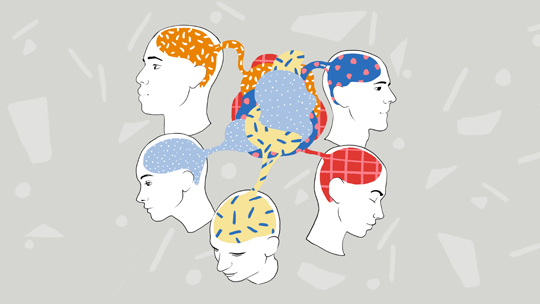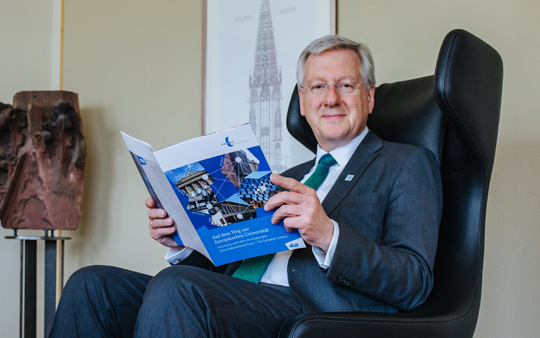Setting creativity free
Freiburg, Jun 11, 2018
The University of Freiburg draws up a strategy for the future. “Connecting Creative Minds: Trinational, European, Global” is the motto the university has taken for its further development. Nicolas Scherger spoke to the Rector, Dr. Hans-Jochen Schiewer, about what that means.

Illustration: Svenja Kirsch
uni’leben: Professor Schiewer, who are the creative minds at the University of Freiburg?
Hans-Jochen Schiewer: The creative minds are all the members of the University of Freiburg. Creativity can only unfold when all the people who work, teach, study and conduct research here inspire one another: our personnel in administration and technology, who support research and teaching, just as much as our students, who discuss and make critical commentaries of our researchers’ hypotheses and results. And of course our researchers, whose creativity is manifest in manifold exchanges. This collaboration of all the people at this university is what will take us forward.
Why is that so important?
We are in an international competiton. If we are able to make our university even more lively and creative via new, cross-border networking options for our creative minds – then we can keep the best minds in Freiburg and at the same time attract more to this location. In this way we are creating a trade mark for outstanding research and teaching and securing our strength in performance and innovation, and our ability to renew. That is something we can only do if we work together as a strong community and collaborate with the right partners.
Where is this networking already taking place?
We are making concentric circles of contacts: first at the University of Freiburg, in day-to-day studies, teaching and research and institutionalized in places like our academic centers and at the Freiburg Institute for Advanced Studies (FRIAS). Then with academic institutions in the region: In Freiburg for instance we have founded the Fraunhofer Sustainability Center and the Institute of Sustainable Technical Systems, we cooperate closely with the Max Planck Institutes and are founding a School of Education in collaboration with the Freiburg University of Education. With our partners in Eucor – The European Campus in Switzerland, France and Germany we have the clear aim of becoming a European University. And at the global level, we are working with strategic partners in Asia, North America and Australia.
Taking the European Campus as an example: How does it add value?
The European Campus makes it possible to do studies à la carte – at five universities within a radius of 180 kilometers. The students have the unique opportunity to experience different academic cultures in Europe every day. Our researchers work in a region whose universities are global leaders in many areas even when they stand alone; but now they are reinforcing one another and together are building one of continental Europe’s key academic locations. That makes us attractive all around the world.

Hans-Jochen Schiewer says the European Campus is an outstanding example of networking which releases creativity. The Deutsche Universitätszeitung recently dedicated an issue to the group. Photo: Sandra Meyndt
What else is still to come?
We in the European Campus will complement one another with laboratories and equipment and we’ll create a much more attractive research environment than would be possible in just one city. Researchers will develop cross-border project ideas, students will choose freely as to where they want to continue their academic qualification. We will come up with new study concepts: such as those for a Liberal Arts Education, in which Freiburg has taken a leading role and which we now aim to design and build internationally - Strasbourg is an ideal partner for that with its European institutions. Our global networking will also take on a new dimension. We will have considerably more international students and researchers - who will give us fresh impetus and make joint projects easier.
Part of networking is passing the benefits on to society. What are the plans for that?
Society must be able to have an influence on the university on the one hand, which means we must be open to demands and questions put to us. On the other hand, we want to show what solutions we can offer for the urgent problems of the future - for technical, ethical, legal, right through to socio-political questions. For this we have established formats which we aim to expand: existing brands such as the Studium Generale Saturday Uni, the Colloquium Politicum, and the Freiburg Horizons at FRIAS, as well as new formats at the European Campus, which will help to reconcile differing views about society on this side of the Rhine and the other.
How important to you is your role as a networker for the university?
As Rector it is my job to present our vision and future perspectives not just to our members but to the world: to the national networks, such as the alliance of the leading comprehensive research universities, the German U15; to European groups such as the League of European Research Universities; and to policymakers at the state, federal, and European levels. It is vitally important that people understand in Germany, Europe and around the world what great things are happening here. That is the message I want to take to the world.
Conversation with the Rector
In June and July 2018 the Rector, Professor Dr. Hans-Jochen Schiewer will visit all the faculties at the university to hold personal talks with interested parties about the university’s future strategic direction under the motto “Connecting Creative Minds: Trinational, European, Global.” All students, researchers, and technical and administrative staff are welcome to attend. The sessions are currently being scheduled; exact dates and times for the faculty visits will be announce separately and via the Exzellenzportal.

